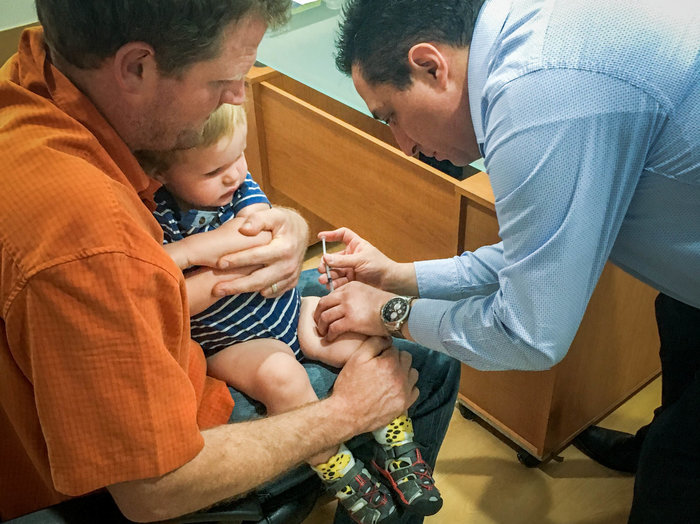
A Dad Takes His Son To The Doctor And Discovers Fear Of Vaccines
for NPRI am a man of science. Okay, perhaps not of science, but certainly near it. As a science journalist, I’m science-adjacent. But I consider myself to be bound by logic and facts.
Which is why it was weird when I took my infant son in for his first vaccines and started peppering his pediatrician with questions. I inspected the boxes, telling myself that I was concerned about a recent bad batch of vaccines in Chiapas, Mexico, that made a bunch of kids sick. But really, I was looking for a label that read “not the autism kind of vaccine.”
I felt really uncomfortable and started to sweat. I looked at the clear liquid in the vials and wondered, will I regret this for the rest of my life? I started to think about maybe delaying the injections until it was safer or maybe stretching them out over a longer period of time. I mean, it just can’t be safe giving all these vaccines at once.
Seriously? I’ve spent years following the vaccine safety debate, reading the stories and writing a few about how safe and effective vaccines are. And yet here I am putting my entire profession to disgrace, just as scared and confused as anyone else. In that moment, I wanted to slap my brain upside the temporal lobe. The sight of one little needle was turning me into a raging anti-vaxxer.
Before I go any further, just so we are clear, every scrap of reliable data confirms that vaccines are a safe and crucial part of medicine. Plenty of very clever people have pointed out that they have very few risks and many benefits, which accrue not only to the child being vaccinated but also to society at large. And there is abundant evidence that they don’t cause autism.

Father and son meet up with the pet pig often seen in their neighborhood in Mexico City.
Courtesy of Erik Vance
But this is not a post about vaccines or autism or even evidence. This is a post about fear. If there is one thing that psychologists can say for sure, it’s that fear is more deep and powerful than just about any other emotion we can experience.
In my book, Suggestible You, I note that while placebos can be incredibly potent in treating some (often chronic) diseases, their alter egos — nocebos — are reliably more so. Nocebos occur when something unhealthy happens to your body, solely based on belief. They can be as simple as feeling slightly more pain during an experiment just because a doctor says you should or as complex as side effects for placebo pills, or mass hysteria. Perhaps the best example of a nocebo in pop culture would be a curse. (In the book, I even get cursed myself at one point.) In other words, if placebos are hope, nocebos are fear.
Scientists have found that nocebos are easier to create than placebos — and last longer. So fear is more powerful in the body than hope. Saying “fear is a powerful thing” is a little like saying “money can come in handy” — it kind of undersells it. Fear is the No. 1 tool for selling newspapers, insurance, snake-oil medicine and Swedish cars. Sometimes that’s a good thing, and sometimes it’s not. It’s what kept our ancestors alive for millions of years, and it’s history’s favorite way of selling political ideology.
So it’s not surprising that fear forces people to accept some strange ideas about medicine. The most tragic and extreme of these are cancer patients so terrified of modern cancer therapies that they turn toward more “natural” solutions and shun proven treatments that could have saved their lives.
(For the full story click here)